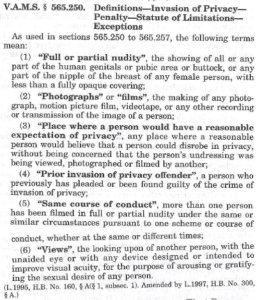For the past ten years, the misdemeanor of invasion of privacy in the second degree has been special to me. Why? I’ve only seen it charged once, in a case assigned to me at the public defender’s office. And it was the first case that I got to first chair at jury trial (an event I had been impatiently awaiting).
The case began in a church bathroom. A teenage boy reported to police that, as he was sitting on the toilet, he looked up and saw that someone was pointing a camera at him over the wall of the bathroom stall. My client was arrested. The digital camera in his possession at the time of his arrest was seized. No photographs of the teen or the bathroom were found on the on the camera or its memory card.
The state had to prove six things beyond a reasonable doubt for the jury to find my client guilty:
- The victim was in the bathroom stall in the church bathroom, and
- The stall was a place where a person would have a reasonable expectation of privacy, and
- The defendant knowingly viewed/photographed/filmed the victim, and
- At the time of such viewing/photographing/filming, the victim was in a state of full or partial nudity, and
- Such viewing/photographing/filming was without the knowledge and consent of the victim, and
- That the defendant knew that such viewing/photographing/filming was without the knowledge and consent of the victim.
Given the lack of photos on the camera and the layout of the bathroom, there was a plausible argument to be made that my client did not and/or could not succeed in viewing/photographing/filming the victim in a “state of full or partial nudity.” (See definitions in Figure 1).
 As my client had a record, the prosecutor wanted him to serve the max – one year in jail. However, I knew that if they jury found that my client had attempted (but failed) to commit the offense, the maximum punishment was only fifteen days in jail. My client had nothing to lose by taking it to the jury.
As my client had a record, the prosecutor wanted him to serve the max – one year in jail. However, I knew that if they jury found that my client had attempted (but failed) to commit the offense, the maximum punishment was only fifteen days in jail. My client had nothing to lose by taking it to the jury.
When the law was first enacted in 1995, “invasion of privacy” was separated into two separate offenses – invasion of privacy in the first degree (RSMo. § 565.252) and invasion of privacy in the second degree (RSMo. § 565.253). “First degree” invasion of privacy occurred when a photo or film was taken and disseminated. Invasion of privacy stayed as two separate offenses through December 31, 2016. Then the criminal code revision consolidated those two offenses into one simply called “invasion of privacy” that went into effect on January 1, 2017. The statute of limitations for a misdemeanor offense of invasion of privacy is three years. This is unusual, as the statute of limitations for nearly all other misdemeanors is one year.
In the invasion of privacy case I took to jury trial, I had numerous exhibits to explain the bathroom layout. The one I remember most vividly was an enlarged photo of my (fully clothed) paralegal sitting on the toilet. It was taken from where the victim said he saw the camera to show that, from that angle, you couldn’t see anything, um, private. I argued that the state did not prove beyond a reasonable doubt that my client succeeded in committing the offense. But the jury found him guilty and the judge gave him the max. I kept the jury out a while, though, and my client was thankful for my efforts.
I’ll never forget that unusual case that gave me my first jury trial as lead attorney.
Things I like this week:
- Sen. Caleb Rowden filed SB900, an Employer Freedom bill that repeals the ban on felons selling lottery tickets and alcohol. Sen.Kiki Curls co-sponsored the bill. A similar bill will be filed next week in the house by Rep. Cheri Reisch. Anticipated co-sponsors at this time include Rep. Robert Cornejo and Rep. Bruce Franks, Jr.
- Although I doubt Rep. Shamed Dogan will be needing their services, he is still fighting hard for hair braiders. And his bill passed with flying colors through two committees. It now sits on the perfection calendar in the House.
- Thanks to Senator Ron Richard’s leadership, two of GovernorEric Greitens’ appointees – Will Kraus and Ryan Silvey – were approved by the Senate the first week of session, and twenty more got confirmed on January 10th (prior to the fateful state of the state address). I hope more of the many worthy appointees awaiting confirmation are approved soon as well.
https://themissouritimes.com/47291/cameras-photographs-and-full-or-partial-nudity/